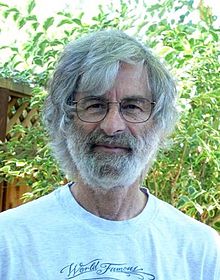Leslie Lamport | |
|---|---|
 | |
| Born | February 7, 1941 New York City, U.S. |
| Alma mater | |
| Known for | |
| Awards |
|
| Scientific career | |
| Fields | Computer science |
| Institutions | |
| Thesis | The analytic Cauchy problem with singular data (1972) |
| Doctoral advisor | Richard Palais[1] |
| Website | lamport |
Leslie B. Lamport (born February 7, 1941) is an American computer scientist and mathematician. Lamport is best known for his seminal work in distributed systems, and as the initial developer of the document preparation system LaTeX and the author of its first manual.[2]
Lamport was the winner of the 2013 Turing Award[3] for imposing clear, well-defined coherence on the seemingly chaotic behavior of distributed computing systems, in which several autonomous computers communicate with each other by passing messages. He devised important algorithms and developed formal modeling and verification protocols that improve the quality of real distributed systems. These contributions have resulted in improved correctness, performance, and reliability of computer systems.[4][5][6][7][8]
- ^ Leslie Lamport at the Mathematics Genealogy Project
- ^ Lamport, Leslie (1986). LaTeX: A Document Preparation System. Addison-Wesley. ISBN 978-0-201-15790-1. Retrieved 2019-06-20.
- ^ Lamport, Leslie (2013). "Leslie Lamport - A.M. Turing Award Winner". ACM.
- ^ Leslie Lamport author profile page at the ACM Digital Library
- ^ Lamport, L. (1978). "Time, clocks, and the ordering of events in a distributed system" (PDF). Communications of the ACM . 21 (7): 558–565. CiteSeerX 10.1.1.142.3682. doi:10.1145/359545.359563. S2CID 215822405.
- ^ Leslie Lamport publications indexed by Microsoft Academic
- ^ Savage, N. (2014). "General agreement: Leslie Lamport contributed to the theory and practice of building distributed computing systems that work as intended". Communications of the ACM. 57 (6): 22–23. doi:10.1145/2601076. S2CID 5936915.
- ^ Hoffmann, L. (2014). "Q&A Divide and Conquer: Leslie Lamport on Byzantine generals, clocks, and other tools for reasoning about concurrent systems". Communications of the ACM. 57 (6): 112–ff. doi:10.1145/2601077. S2CID 31514650.